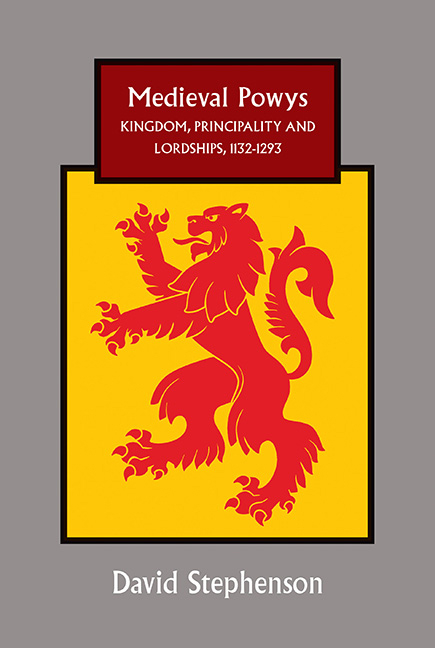Book contents
- Frontmatter
- Dedication
- Contents
- List of Illustrations
- Acknowledgements
- Abbreviations
- Map
- Miscellaneous Frontmatter
- Introduction: The problem of medieval Powys: historiography and sources
- Part I Powysian Polities in the Twelfth and Thirteenth Centuries: A Political Narrative
- Part II Characteristics of the Powysian Polities: Structures, Fault-Lines and Political Culture
- 9 Powysian polities I: aspects of governance
- 10 Powysian polities II: secular dynamics; fragmentation and integration
- 11 Powysian polities III: the ecclesiastical dimension
- 12 Some Powysian perspectives: fears and aspirations
- Appendices
- Select bibliography
- Index
- Miscellaneous Endmatter
10 - Powysian polities II: secular dynamics; fragmentation and integration
from Part II - Characteristics of the Powysian Polities: Structures, Fault-Lines and Political Culture
Published online by Cambridge University Press: 29 April 2017
- Frontmatter
- Dedication
- Contents
- List of Illustrations
- Acknowledgements
- Abbreviations
- Map
- Miscellaneous Frontmatter
- Introduction: The problem of medieval Powys: historiography and sources
- Part I Powysian Polities in the Twelfth and Thirteenth Centuries: A Political Narrative
- Part II Characteristics of the Powysian Polities: Structures, Fault-Lines and Political Culture
- 9 Powysian polities I: aspects of governance
- 10 Powysian polities II: secular dynamics; fragmentation and integration
- 11 Powysian polities III: the ecclesiastical dimension
- 12 Some Powysian perspectives: fears and aspirations
- Appendices
- Select bibliography
- Index
- Miscellaneous Endmatter
Summary
One of the most important recurrent features revealed by the narrative set out in the first part of this study is the tendency of Powysian polities to fragment at moments of dynastic stress, and under the impact of external intervention. The whole subject of fragmentation within Welsh polities was highlighted by J. G. Edwards's British Academy lecture, ‘The Normans and the Welsh March’, in which he advanced the argument that kingship in Wales was ‘inherent in each commote’, so that fission into multiple fully royal polities was a frequent phenomenon, a natural consequence of the Welsh political structure. That idea was prevalent for a generation, until it was undermined by the work of Beverley Smith, whose approach stemmed from his demonstration that the Welsh law-texts set out clearly mechanisms for the transmission of a large polity – such as Gwynedd, Powys or Deheubarth – in its entirety to a single heir. Fragmentation was not, therefore, the product of the inevitable workings of a concept of the partible regnum, but resulted, in Powys in 1160, Gwynedd in 1170 and Deheubarth in 1197, from the ‘rejection by the membra regis of the apanage provision made for them, and the inability of any one of them to determine the issue by force’. Much of Smith's analysis cannot be gainsaid; but the following survey will indicate that in terms of practical politics detached fragments of the Powysian realm, however produced, threatened to become permanent. Lordship base on concepts of regality might not be inherent in the commote or cantref, but the socio-political nature of the commote or cantref might make it relatively easy for multiple regalities, or lordships, to develop.
Numerous territorial fault-lines associated with morcellation within Powys are evidenced by the following, far from exhaustive, examples. Mechain, at the heart of Madog ap Maredudd's kingdom, subsequently became the centre of the lordship associated with one of Madog's sons, Owain Fychan. After Owain's death at the hands of the sons of Owain Cyfeiliog in 1187, Mechain was apparently occupied by Gwenwynwyn ab Owain. Regained by Owain Fychan's sons after Gwenwynwyn's death, Mechain was partitioned into two segments, Is Coed and Uwch Coed. By the 1270s it is clear that it had been further fragmented, with some lands within it occupied by members of the dynasty of northern Powys and some by descendants of Owain Fychan.
Information
- Type
- Chapter
- Information
- Medieval PowysKingdom, Principality and Lordships, 1132-1293, pp. 215 - 247Publisher: Boydell & BrewerPrint publication year: 2016
